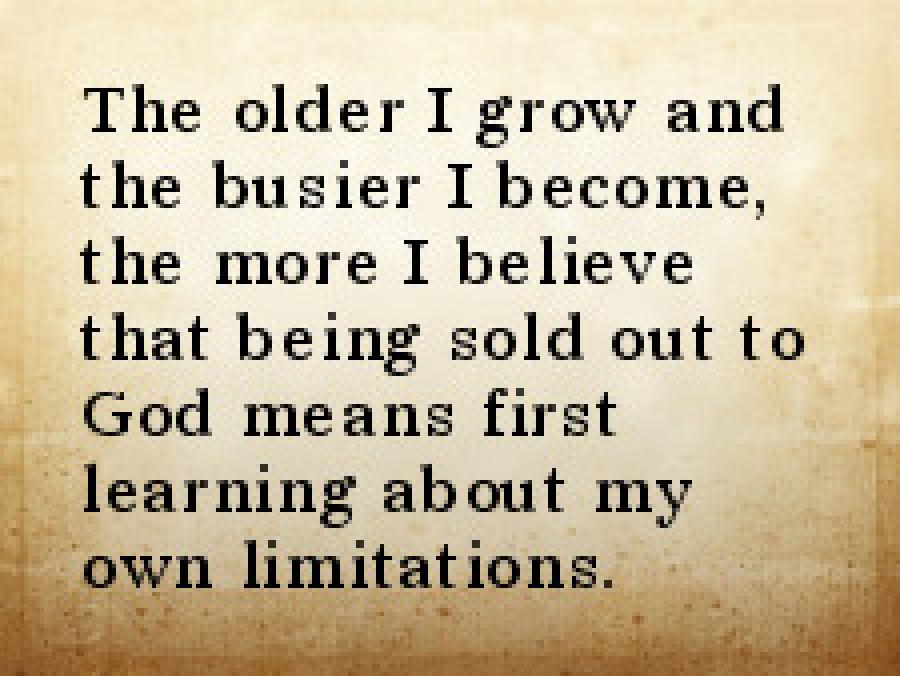They Also Serve
Image

These are busy days for our little family—days filled with scout meetings, schoolwork, doctor’s appointments, and ministry. I’m also in the final months of a book project; so on top of it all, I find myself experiencing a curious strain of nesting syndrome. My mind is a whirl of spreadsheets and marketing concepts, of deadlines and trying to merge multiple callings into one. I’m learning and relearning how to be mother and wife and lover and writer and daughter and teacher and friend.
And most of the time, I feel like I’m failing on all counts.
Every morning, I wake up with more on my “to do” list than is humanly possible, and every night I go bed having proven it. But instead of simply acknowledging my limitations, I regularly feel discouraged and overwhelmed. In fact, I have been feeling this way so often that I finally had to face a harsh reality. I am a prime candidate to join that particular type of support group that meets in musty church basements. I need to draw my chair up into the circle and when it’s my turn, bravely stand and say, “Hello, my name is Hannah and I have a messiah complex.”
But I don’t think I’ll be alone there.
I’ve noticed a certain agitation among women of my age, a longing to do more. We are tempted to believe that what we are already doing is not enough, that the dishes and laundry and school lunches are not “real,” that ministry that is not global or public or exciting (like reconciling races or saving orphans) is not true ministry. We see the brokenness around us. We want to change the world. We are ready.
But I worry. I worry because if this impulse is not properly rooted, it will very quickly lead to burnout.
I’ve seen it in my own life. All that holy passion and zeal, the joy of finally discovering my voice, of finding my place in the kingdom can quickly be replaced by needing to save the kingdom all by myself. And when I can’t—when I’m busy with more mundane things—the guilt creeps in. I hear a voice saying, “You have so much to do. Don’t you dare rest yet.” And, “How selfish of you—you live a life of privilege and ease. Why aren’t you suffering for the gospel?”
I grew up in a context that, for good or bad, heavily emphasized what we needed to do for God. We were told to sacrifice this life for the next, to be sold out, to be surrendered, to be on fire, to be radical. And I was. And I am. But the older I grow and the busier I become, the more I believe that being sold out to God means first learning about my own limitations.
In order to work for Him, I must first learn to rest in Him.
Micah 6:8 has become something of a theme song for our generation. “What does the LORD require of you but to do justice, and to love kindness, and to walk humbly with your God?” (Micah 6:8). The cause of justice and equality pulses through our veins. We long to “proclaim good news to the poor…to proclaim liberty to the captives and recovering of sight to the blind, to set at liberty those who are oppressed, to proclaim the year of the Lord’s favor” (Luke 4:18).
But can I say something? Can I ask you to stop trying to save the world? Can I encourage you to embrace your life of limitation? Because here in the weakness, in the failure, in the inability, He is strong. And here, only in your limitation, will you ever learn to walk humbly with Him.
And it is only when you learn to walk humbly with Him that you will be able to do justice and love kindness the way that He does.
Almost 400 years ago, there was a man who had a tremendous gift. He was a poet and statesman, an active political thinker and even deeper personal philosopher. But then the lights went out. By the time he was 44, he was completely blind. It seemed like a cruel joke—how did God expect him to use his talent for the kingdom when he couldn’t even see to write? “Does God exact day-labour, light denied?” he asked.
The answer he found is one that we need today:
God doth not need
Either man’s work or his own gifts: who best
Bear his mild yoke, they serve him best. His state
Is kingly; thousands at his bidding speed
And post o’er land and ocean without rest:
They also serve who only stand and wait.
God is inviting us to work in His kingdom. He is calling us to something more than this world can offer. But He is calling us first to Himself, to remember that He is the Messiah. Not us. And He is calling us to believe that those “who best bear his mild yoke, they serve him best.”
Even if they only stand and wait.
handerson Bio
Hannah R. Anderson lives in Roanoke, VA where she spends her days mothering three small children, loving her husband, and scratching out odd moments to write. She blogs at Sometimes a Light and has recently published Made For More.
- 5 views


Discussion